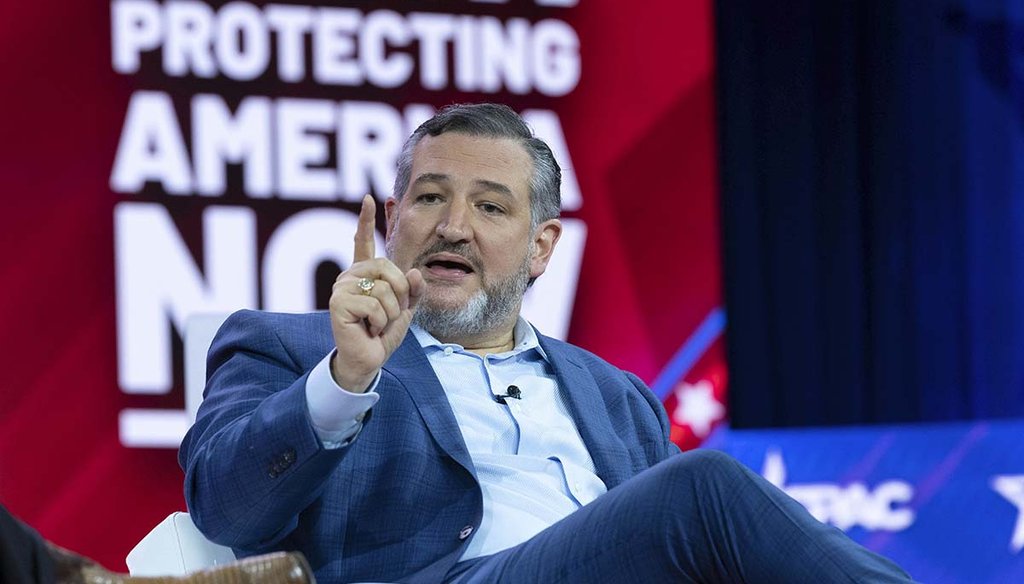Stand up for the facts!
Our only agenda is to publish the truth so you can be an informed participant in democracy.
We need your help.
I would like to contribute

Sen. Ted Cruz, R-Texas, speaks March 2, 2023, during the Conservative Political Action Conference, CPAC 2023, at the National Harbor, in Oxon Hill, Md. (AP)
Ted Cruz: Obama said Iran has a ‘right’ to nuclear weapons. Not quite
If Your Time is short
-
Critiquing Democrats’ foreign policy, U.S. Sen. Ted Cruz, R-Texas, asserted that President Barack Obama supported Iran’s right to nuclear technology.
-
Obama said any country, including Iran, should have the right to access "peaceful nuclear power" if it complies with the 1968 Nuclear Non-Proliferation Treaty.
-
Nuclear power is different from nuclear weapons, but the two share some of the same technology and both need nuclear fuel.
Critiquing Democrats’ foreign policy, U.S. Sen. Ted Cruz asserted that former President Barack Obama supported Iran’s right to possess nuclear technology, including weapons.
Speaking on May 17 at a conservative think tank in Washington, D.C., Cruz compared Obama’s foreign policy stance to that of President Joe Biden related to Ukraine, Russia and Iran. The Republican senator from Texas called Democrats "hopelessly naive when it comes to foreign policy."
Obama "gave a speech where he said Iran has a right — he used that word, ‘right’ — to nuclear technology," Cruz said during the Hudson Institute talk. "I gotta say, that’s utterly imbecilic. I’m familiar with the right to life, with the right to liberty, or the right to pursuit of happiness. I’m not familiar with the right to nuclear weapons. … Only a fool would want the Ayatollah to have nuclear weapons."
PolitiFact looked into what Obama said regarding Iran’s right to possess nuclear weapons and found that Cruz’s claim is off the mark. Obama was speaking of nuclear power, not nuclear weapons.
Cruz’s office did not tell us what it was referring to. But it appears to stem from Obama’s June 4, 2009, address at the University of Cairo. In his speech, Obama sought to reset strained relations between the United States and the world’s Muslims.
Obama covered what he described as several "sources of tension" between the U.S. and Islam, including violent extremism, the wars in Afghanistan and Iraq, the Israeli-Palestinian conflict, women’s rights, and nuclear arms and Iran.
On nuclear arms, he said he was committed to "a world in which no nations hold nuclear weapons." He reiterated his support for the Nuclear Non-Proliferation Treaty, the 1968 agreement that aimed to limit nuclear technology’s spread and was signed by leaders of several major nuclear and non-nuclear powers.
He said he supported Iran having access to "peaceful nuclear power" as long as it complied with that treaty. Obama’s full statements, according to a White House transcript, were:
"I understand those who protest that some countries have weapons that others do not. No single nation should pick and choose which nation holds nuclear weapons. And that's why I strongly reaffirmed America's commitment to seek a world in which no nations hold nuclear weapons. And any nation — including Iran — should have the right to access peaceful nuclear power if it complies with its responsibilities under the nuclear Non-Proliferation Treaty. That commitment is at the core of the treaty, and it must be kept for all who fully abide by it. And I'm hopeful that all countries in the region can share in this goal."
Both nuclear weapons and nuclear power are based on the energy released when an atom splits in two, a process called fission, explained Brendan Green, an associate professor at the University of Cincinnati who studies U.S. foreign policy and nuclear weapons.
In a nuclear reactor, that reaction is controlled, allowing a relatively constant stream of fission, Green said. Energy is used to turn water into steam, which powers electrical generators and slowly depletes the nuclear fuel.
In a nuclear weapon, the reaction is allowed to develop into an uncontrolled "chain reaction," producing fission until the energy from the reaction explodes. "As it does so, it releases a truly extraordinary amount of energy in the form of light, heat and radiation," Green said.
The United States generates more nuclear power than any other country, according to the U.S. Energy Information Administration. Since 1990, nuclear power plants have supplied roughly 20% of total annual U.S. electricity.
So, can a nuclear reactor be turned into a nuclear weapon? No, wrote the Brookings Institution, a U.S. think tank. In a nuclear weapon, radioactive atoms are packed densely enough within a small chamber to initiate an instantaneous explosive chain reaction. A nuclear reactor is too large to produce the density and heat needed to create a nuclear explosion.
But having a nuclear reactor can give countries access to some critical materials needed to build nuclear weapons, energy experts say.
Featured Fact-check
Under international inspection, nuclear reactors alone contribute little to the spread of nuclear weapons, said Matthew Bunn, a nuclear policy analyst at Harvard University’s Kennedy School of Government. However, nuclear fuel, particularly enriched uranium and reprocessed plutonium, can be used for weapons.
Although numerous challenges exist to make a nuclear bomb, the most difficult step is likely producing the material for fission, Green said. A nuclear energy program both requires and produces the fissile materials needed to make a bomb.
"This is a well-known limitation of the Nuclear Non-proliferation Treaty: it forbids non-nuclear weapons states from having nuclear bombs, but it allows them to have ‘peaceful nuclear power programs’ through which states can obtain the material needed to make bombs," Green said. "An obvious worry is that states could therefore use their peaceful nuclear energy programs to develop a nuclear weapon while remaining in good standing with the treaty until the last minute."
Green added, "Bottom line: In my opinion, Cruz’s quote is an overstatement. But he is pointing to a real policy issue, upon which he and Obama were lined up on opposite sides."
Patrick Rodenbush, an Obama spokesperson, said Cruz "is pretty clearly misconstruing the speech and President Obama’s position."
The Iran nuclear agreement, formally known as the Joint Comprehensive Plan of Action, which was signed in 2015 during Obama’s presidency, significantly restricted Iran’s nuclear program in exchange for sanctions relief. Cruz has repeatedly criticized the nuclear deal, arguing that it will make the U.S. less safe by giving Iran access to nuclear technology.
Rodenbush directed PolitiFact to a 2018 statement by Obama, in which he criticized former President Donald Trump’s decision to withdraw from the accord, arguing that Iran would now be more likely to obtain nuclear weapons.
"We were clear-eyed that Iran engages in destabilizing behavior — including support for terrorism, and threats toward Israel and its neighbors," Obama said then. "But that’s precisely why it was so important that we prevent Iran from obtaining a nuclear weapon. Every aspect of Iranian behavior that is troubling is far more dangerous if their nuclear program is unconstrained."
In response to PolitiFact Texas’ questions, Darin Miller, a Cruz spokesperson, argued that Iran has no use for nuclear technology beyond building weapons.
"Iran floats on a sea of oil. The only use they have for nuclear technology is to build nuclear weapons," Miller said in an email. "When they or their supporters talk about a right to nuclear technology, that’s what they mean. And that’s ultimately what the Ayatollah intends to do with the technology."
Cruz credited Obama with saying that Iran has a "right" to nuclear technology, including weapons.
Obama in 2009 said Iran "should have the right to access peaceful nuclear power if it complies with its responsibilities under the nuclear Non-Proliferation Treaty." He did not say it had the right to nuclear weapons.
Experts we spoke to said it is possible, although not easy, to use materials used for peaceful nuclear power to build nuclear weapons.
The U.S. under Obama in 2015 entered a global agreement that dismantled much of Iran’s nuclear program and opened its facilities to international inspections. As recently as 2018, Obama said Iran should be prevented from obtaining nuclear weapons.
We rate Cruz’s statement Mostly False.
Our Sources
Barack Obama, speech in Cairo, Egypt, June 4, 2009.
Ted Cruz, remarks at the Hudson Institute, May 17, 2023.
NPR, Obama Seeks ‘New Beginning’ With Muslim World, June 4, 2009.
Email interview with Darin Miller, spokesman for Ted Cruz, May 25, 2023.
Email interview with Matthew Bunn, a nuclear policy analyst at Harvard University’s Kennedy School of Government, June 1, 2023.
Email interview with Brendan Green, associate professor at the University of Cincinnati, June 1, 2023.
Email interview with Patrick Rodenbush, spokesman for Obama, June 2, 2023.
U.S. Energy Information Administration, Nuclear explained.
Brookings Institution, Terrorism and Nuclear Energy: Understanding the Risks, March 1, 2002.
CNBC, Transcript of statement from Obama criticizing withdrawal from Iran nuclear agreement, May 8, 2018.
Browse the Truth-O-Meter
More by Sarah Bahari
Ted Cruz: Obama said Iran has a ‘right’ to nuclear weapons. Not quite
Support independent fact-checking.
Become a member!
In a world of wild talk and fake news, help us stand up for the facts.
























